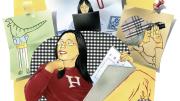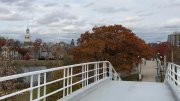I’ve had a lot of long conversations recently. Chance moments—lazy evenings or weekend mornings spent lingering in the dining hall; the common room late at night, with all my roommates joining in. Conversations about big things, like priorities and life plans, friends and relationships, work-family balance. Little things that turn into big things: Are you taking the GRE this spring? Where will you be this summer?
I’ve heard these conversations have come early. We’re only (only?) juniors. One year is a comfortable buffer before the end of college; my wall calendar can’t yet show my entrance into the real world. Still, Harvard students are nothing if not overachievers, and I’ve started to feel some premature separation anxiety. Away from the familiar structure of classes and extracurriculars, life seems bewilderingly open.
I’m not the only one restless and undecided. Two summers ago there was a popular New York Times article, “What Is It About 20-Somethings?” It described a generation caught in emerging adulthood—still in a period of flux, experimenting with jobs and relationships, curious and reluctant to settle down. A Harvard education, a recently graduated friend told me, means being able to take risks, screw up, and still land on your feet.
We are undoubtedly lucky; young, well educated, with no shortage of opportunity. But the future still feels intimidating. The perpetual cycle of applications for internships and fellowships is a reminder of small, unconscious choices and big decisions looming ahead. Recently I’ve heard from friends who worry about finding a job they love, or who wonder if there’s any single thing they like enough to do for the rest of their lives. Many people enter Harvard with varied interests, and are afraid that having a job and being out in the real world will mean less time for hobbies and exploration. Less discussed, but still wondered about, are questions about friendships and relationships—how long they will last, and how to maintain them.
I sometimes have a feeling of dread, thinking about graduation as an end. College is the best time of your life, I’ve heard people say, and graduation can mean the end of a unique experience and unique opportunities. But there is also the aspect of commencement, and a sense of beginning. Many of your most important decisions will be made in your twenties, my friend’s parent told him. Recently I’ve had the feeling of being dormant, waiting for life to begin.
I guess I’m one to seek out guidance and advice. In the pages of the red books, reunion reports from Harvard alumni, are hundreds of paths and perspectives laid end to end. I’ve been reading these stories with an eye turned toward my own future. (Ever a student, I’d like a textbook in life lessons as well.)
It’s jarring to see things through the eyes of a different cohort. Reading through the progression of reports—the fifth, tenth, twenty-fifth, and finally fiftieth reunion—I see people’s focuses and concerns evolve and change. The early reports are short but familiar, dominated by descriptions of jobs and work. Children, far from my current concern, dominate the twentieth and twenty-fifth.
But I’ve been especially interested in reports from the fiftieth-reunion classes. The alumni are asked to answer a survey about their views, habits, accomplishments, and regrets, and to write about events that have affected their lives, important accomplishments, reflections on the past. Reading these reflections, told later in full and vibrant lives, I’m able to situate myself, perhaps foresee how things will probably change and develop, gain some kind of glimpse into the future.
The class of 1961 graduated in a time when all Harvard students were male, with a smaller population of Radcliffe women, with a student body less economically and ethnically diverse than it is today. In the half-century since their graduation, the class has witnessed cultural and social revolutions, a smattering of wars, immense technological progress. Of course, each successive graduating class enters a slightly different world, but some experiences are nevertheless shared.
Here are some things I’ve learned from the class of ’61.
Life often takes a winding and circuitous path, its direction visible only in hindsight. In even the best-planned lives, unforeseen opportunities often appear, taking people to surprising places. More than a third of those who replied to the class survey said they had made a significant switch in professions, sometimes more than once, and the same proportion admitted to having changed “a lot” over the years. One woman became an Episcopal priest; her ordination would have been impossible when she graduated. One man who’d written in his high-school yearbook that he planned to be an engineer is one still, over fifty years later, but he wrote in his reunion report that he nevertheless “had no idea where the world would be going, how I would interface with it, or of the many people I would meet and work with and who would befriend and teach me.”
The capacity for change never ends. The class reports are full of inspiring examples of people who have reinvented themselves. One man began his entrepreneurial career at the age of 52 and wrote that he’d be creating another start-up between the writing of the report and the actual reunion. Another decided in his sixties to follow his passion for art and writing; since then, he has illustrated several children’s books and written a few novels of his own.
Opportunities like these are partly a matter of luck and privilege, and it is no coincidence that a third of the Harvard men from that class (though only about half as many Radcliffe women) report an annual family income of $250,000 or more. And there is also selection bias in the reports: the entries came only from class members who were alive and reasonably well (and communicative). But at the same time, many alumni wrote of past and present battles with illness, or loss of close family members or friends—events whose chances we 20-somethings vastly underestimate. Still, the alumni are happy. More than three-quarters rank their lives as 8 or above on a 10-point scale (with 10 representing “the best possible life”), compared to 53 percent in a Gallup poll of the general population.
The reports speak to the possibility inherent in a forward-looking, daring mind-set. Though past the usual age of retirement, many members of the class prefer to be active with hobbies or careers, old and new. One woman climbed Mount Kilimanjaro with her son at the age of 71. “I have no plans to retire,” wrote an alumnus. “That’s because I have no plans: opportunities arise and I choose whether or not to follow them. I’m happy to have lived an unexamined, spontaneous life. No regrets.”
As Antoine de Saint-Exupéry wrote in The Little Prince, “All grown-ups were children first. (But few of them remember it.)” One day I happened upon a yearbook of the class of 2011. In the rows of portraits of graduating seniors, I was reminded of the photographs in the reunion reports I’d been reading earlier that day, another kind of senior picture. It’s rare that I speak to adults, particularly much older ones, as peers, but in the reunion reports, I read words meant for classmates. It’s enough to catch a glimpse of the student or child who once was. I’m reminded of something I often forget, that this is what growing up really means—not a state you enter when you reach a certain age, or receive a diploma; no secrets revealed to mysterious grandes personnes. Just people who are, at the core, like me—sometimes worried, sometimes confused. Sometimes hopeful.
“To my surprise,” wrote one alumnus, “I’m less and less the cynic and pessimist I once was. Too many good things have befallen me.”
I’ve been thinking back to myself as a child (already it’s becoming hard to remember). I’ve been thinking about what I imagined for myself, growing up. I wanted to be, in sequence, a paleontologist, a geologist, an author, an artist, a mathematician. Asking classmates, I’ve heard things like policeman, teacher, firefighter, president. It’s funny how our priorities and interests have changed as we draw closer to the real world (though I’m still uncommonly fond of dinosaurs). I still try to catch on to some of that childlike sense of things, absent the worries about money and security.
I’ve also been thinking back two and a half years, to the beginning of college. I’m amazed how much my friends have changed, even some of the most seemingly certain and focused. There’s been a lot of exploration of interests, ideas, and directions for the future. I’ve seen people switch concentrations multiple times, fall in and out of religion, discover new passions and hobbies, develop existing ones. Become discouraged and try something new; become discouraged and try again.No doubt it will continue. No doubt the long conversations will as well. And the late evenings, with worries and fears given voice in darkness, whiling away the night, giving way to sunrise.









